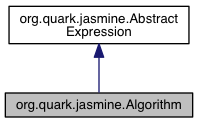|
Jasmine
1.1
Super fast expression and algorithm evaluator
|
|
Jasmine
1.1
Super fast expression and algorithm evaluator
|

Public Member Functions | |
| void | clearVariables () |
| void | showVariables () |
| void | initVariables (Object...params) |
| Answer | answer (String name) |
| abstract Algorithm | eval (Object...vars) |
 Public Member Functions inherited from org.quark.jasmine.AbstractExpression Public Member Functions inherited from org.quark.jasmine.AbstractExpression | |
| AbstractExpression () | |
| Answer | answer () |
| long | getBuildTime () |
| long | getEvalTime () |
| String | infix () |
| String | ast () |
| String | bytecode () |
Protected Attributes | |
| HashMap< String, Double > | __vars = new HashMap<String, Double>() |
 Protected Attributes inherited from org.quark.jasmine.AbstractExpression Protected Attributes inherited from org.quark.jasmine.AbstractExpression | |
| long | __buildTime |
| long | __evalTime |
| Answer | __answer |
| String | infix |
| String | ast |
| String | bytecode |
Private Member Functions | |
| double | toDouble (Object value) |
Additional Inherited Members | |
 Protected Member Functions inherited from org.quark.jasmine.AbstractExpression Protected Member Functions inherited from org.quark.jasmine.AbstractExpression | |
| String | makeInfix (List< Exp > infix) |
| String | makeAST (Exp ast) |
| String | makeAST (Deque< Exp > ast) |
| void | mmakeASTimpl (Exp exp, String tab, StringBuilder sb) |
| String | makeByteCode (byte[] b) |
An algorithm is a series of statements on one or more lines that can be evaluated.
Algorithm extends the capabilities of the Expression class by providing support for variables, selection and iteration constructs. Unlike expression, algorithms does not return a single value, rather you can examine any of the variables after evaluation.
| Answer org.quark.jasmine.Algorithm.answer | ( | String | name | ) |
Use this to get the value stored in a variable after evaluation has finished.
| name | the name of the variable |
| void org.quark.jasmine.Algorithm.clearVariables | ( | ) |
Initialize all the variables to zero. The variables are not cleared before or after an evaluation so that variable data persists between evaluations. If you don't want the data to persist call this method before calling eval(...)
|
pure virtual |
Jasmine using ASM to generate the code for this method.
The parameters represent the initial values to be used for the evaluation and are expressed as pairs "variable _name", variable+value. For instnace
("m", 4.6, "pi2", 2 * Math.PI)
will initialise the variables m and pi2 to 4.6 and 6.283185307
This method returns 'this' so for example you can chain like this:
algorithm.eval("m", 4.6, "pi2", 2 * Math.PI).answer("m").toFloat(); to get the value stored in 'm' as a float.
| vars | the initial values to use in this evaluation |
| void org.quark.jasmine.Algorithm.initVariables | ( | Object... | params | ) |
This method is called for you when the algorithm is evaluated so it is recommended that you do this by passing initial variable state in the parameters for eval(initial_variable_state)
| void org.quark.jasmine.Algorithm.showVariables | ( | ) |
Display all the variables and their values in the console window.
|
private |
This is used to convert any value passed by the user to a double. It accepts data of any type and attempt to convert it to a double. If it's not possible it returns 0.0